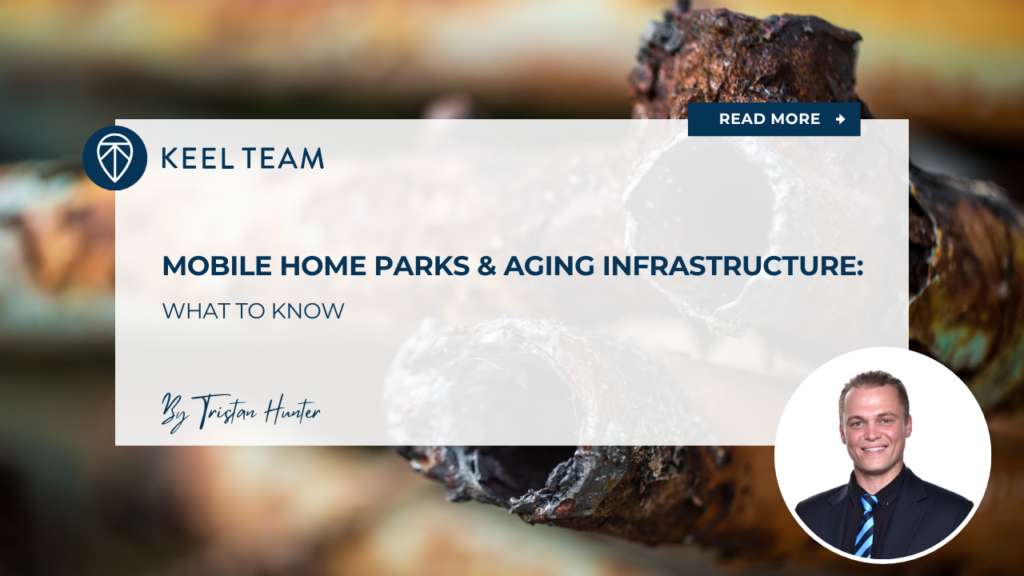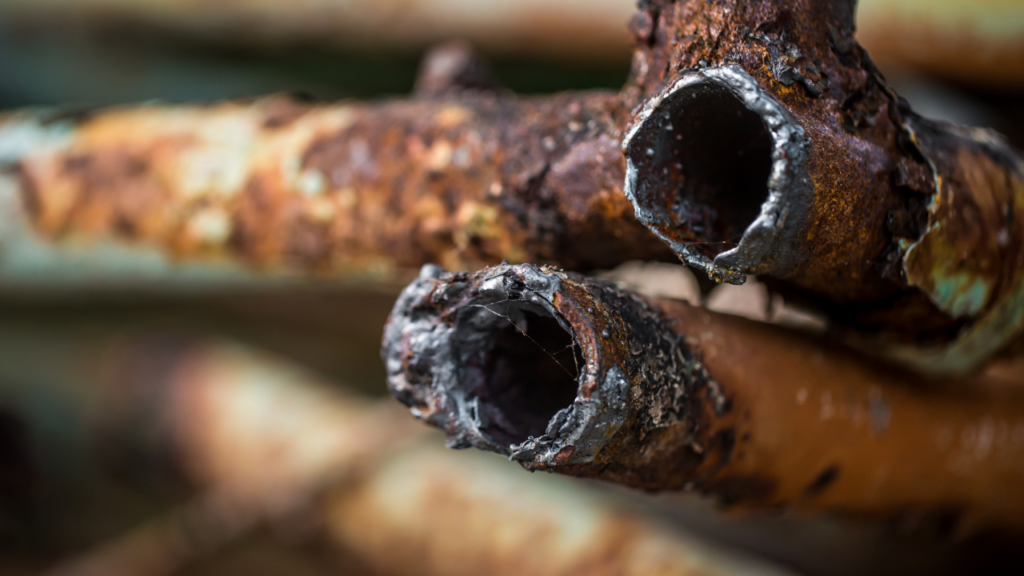Mobile Home Parks & Aging Infrastructure: What to Know
-
 Tristan Hunter - Investor Relations
Tristan Hunter - Investor Relations

Mobile home parks can be a profitable and stable investment option, often offering consistent returns and lower operating costs compared to other real estate assets. However, aging infrastructure is a critical issue that can significantly impact the value and profitability of these properties. Investors should consider conducting thorough due diligence to identify potential problems and budget for necessary repairs or upgrades. This guide outlines key areas to inspect when evaluating mobile home parks and how to manage these challenges effectively.
1. Water and Sewer Systems
One of the most crucial components of mobile home parks is the water and sewer infrastructure. Many older mobile home parks still rely on outdated systems, such as clay pipes or galvanized steel, which are typically prone to corrosion, leaks, or even collapse over time. According to the Environmental Protection Agency (EPA), leaks in aging water infrastructure can waste nearly 14% of the water supply annually, a significant loss that affects operational costs.
When conducting due diligence, it’s important to inspect these systems thoroughly. Investors should review past maintenance records, look for visible signs of water damage, and test for pressure inconsistencies. Consider hiring a licensed plumber or infrastructure specialist to perform a camera inspection of the pipes to identify hidden issues. If these problems go unchecked, they could lead to costly repairs or compliance violations down the line.
2. Electrical Systems
Another area of concern for mobile home parks is the electrical infrastructure. Older mobile home parks may still operate on outdated electrical panels or wiring systems that are not compatible with modern safety standards. A report from the National Fire Protection Association indicates that electrical failures are among the top five causes of fires in mobile home communities.
Inspecting the trailer park’s electrical systems can be essential. Verify whether the wiring and transformers are up to code and capable of handling the electrical load of newer mobile homes. If updates are needed, consider budgeting for these costs as part of the investment analysis. Upgrading electrical systems typically improves safety and also enhances the overall attractiveness of the mobile home park for future tenants.
Download our FREE eBook on the Top 20 things to know BEFORE investing in mobile home parks!
3. Roads and Paved Areas
The condition of roads and other paved areas can directly impact tenant satisfaction and operational costs. Roads in older mobile home parks often show signs of wear, such as cracks, potholes, and poor drainage. These issues not only affect the aesthetic appeal but also pose safety hazards and increase liability risks for the owner.
A study by the Asphalt Institute highlights that well-maintained roads reduce maintenance costs by up to 50% compared to neglected ones. During due diligence, investors should walk the property and inspect the roads, driveways, and any parking areas for damage. An assessment by a professional paving company can provide an estimate for necessary repairs or resurfacing. Ensuring well-maintained roads can increase tenant satisfaction, reduce future costs, and increase overall appeal and value.
4. Drainage and Flooding Issues
Mobile home parks with outdated or inadequate drainage systems are at risk of flooding, which can cause extensive damage to the property and tenant homes. Older trailer parks may have drainage systems that were not designed to handle heavy rainfall or changing weather patterns, leading to frequent standing water issues. The Federal Emergency Management Agency (FEMA) reports that flooding is the most common natural disaster, affecting nearly 90% of disaster-related property damage in the U.S.
Investors should consider assessing the drainage infrastructure and look for signs of past flooding, such as erosion, mold, or damage to homes and common areas. Check if the mobile home park is located in a flood-prone area and, if so, whether the current drainage system is sufficient. Upgrading these systems may require significant investment but can prevent larger losses in the future.

5. Gas Lines and Utilities
Gas lines and utility connections are another important aspect of mobile home park infrastructure. Aging gas lines, particularly those made from outdated materials like iron or bare steel, are prone to leaks and corrosion, which can be dangerous. The U.S. Pipeline and Hazardous Materials Safety Administration (PHMSA) notes that corrosion is the leading cause of gas pipeline failures, accounting for approximately 20% of incidents.
During the due diligence process, investors should look at verifying when the gas lines were last inspected and whether they comply with current safety regulations. Inspecting utility connections and meters is also important, as outdated setups may not support the requirements of modern mobile homes. If significant upgrades are necessary, consider factoring these costs into the investment analysis to avoid unexpected expenses down the road.
6. Foundations and Lot Infrastructure
The foundations and lot infrastructure of mobile home parks must also be thoroughly inspected. Older trailer parks might have issues with unstable soil, poorly installed pads, or uneven surfaces that can affect the stability of mobile homes. According to a report by the Manufactured Housing Institute, ensuring proper lot preparation and foundation stability can be essential for maintaining the longevity of mobile home communities.
A walk through the mobile home park to observe the conditions of the lots and foundations could help. Try look for signs of shifting soil, erosion, or cracks in concrete pads. Consulting with a civil engineer or geotechnical expert can provide further insight into any risks and the potential costs associated with stabilizing the ground or reinforcing foundations.
The utility infrastructure can be the most expensive land improvement in a mobile home park – Andrew Keel, CEO of Keel Team
7. Budgeting for Repairs and Upgrades
When evaluating a mobile home park with aging infrastructure, creating a realistic budget for repairs and upgrades can prove critical. Experts recommend setting aside 5-10% of the mobile home park’s revenue annually for capital expenditures, including infrastructure updates. This approach aims to ensure that investors have the funds needed to address issues without significantly affecting cash flow.
Try to obtain estimates from contractors or specialists during due diligence to understand the potential costs of necessary upgrades. It’s also may be wise to build a contingency fund for unexpected repairs, particularly in older mobile home parks where issues may arise suddenly. Factoring these costs into the overall investment plan can help maintain financial stability and long-term profitability potential.
Conclusion
Aging infrastructure can present challenges for mobile home park investors, but identifying these issues early can prevent larger problems down the line. By inspecting water and sewer systems, electrical setups, roads, drainage, and other critical areas, investors can make informed decisions about potential investments. Proper budgeting for repairs and upgrades further supports the long-term success and profitability of the mobile home park. With a proactive approach, investors can potentially mitigate aging infrastructure risks and capitalize on the opportunities that mobile home park investing offers.
Book a 1-on-1 consultation with Andrew Keel to discuss:
- A mobile home park deal review
- Due diligence questions
- How to raise capital from investors
- Mistakes to avoid, and more!
Disclaimer:
The information provided is for informational purposes only and is not investment advice or a guarantee of any kind. We do not guarantee profitability. Make investment decisions based on your own research and consult registered financial and legal professionals. We are not registered financial or legal professionals and do not provide personalized investment recommendations.

Tristan Hunter - Investor Relations
View The Previous or Next Post
Subscribe Below 👇





